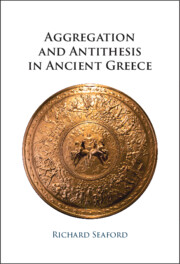Book contents
- Aggregation and Antithesis in Ancient Greece
- Aggregation and Antithesis in Ancient Greece
- Copyright page
- Contents
- Figures
- Preface
- Note on the Text
- Chapter 1 Defining Terms
- Chapter 2 Homer
- Chapter 3 Opposites in Ionian Cosmology
- Chapter 4 Opposites in the Cosmology of Magna Graecia
- Chapter 5 Visual Art from the Near East to Greece
- Chapter 6 The Unity of Opposites in the Fifth Century: Tragedy and Vase-Painting
- Chapter 7 Plato
- References
- Index of Principal Passages
- General Index
Chapter 7 - Plato
Published online by Cambridge University Press: 21 October 2025
- Aggregation and Antithesis in Ancient Greece
- Aggregation and Antithesis in Ancient Greece
- Copyright page
- Contents
- Figures
- Preface
- Note on the Text
- Chapter 1 Defining Terms
- Chapter 2 Homer
- Chapter 3 Opposites in Ionian Cosmology
- Chapter 4 Opposites in the Cosmology of Magna Graecia
- Chapter 5 Visual Art from the Near East to Greece
- Chapter 6 The Unity of Opposites in the Fifth Century: Tragedy and Vase-Painting
- Chapter 7 Plato
- References
- Index of Principal Passages
- General Index
Summary
Fifth-century Greek tragedy and visual art centres on interaction between people, including antithetical relations, reflecting a society shaped by monetised exchange and commerce. Platonic metaphysics is focused on unchanging being, placing supreme value on the possession of money and devaluing or excluding exchange and interaction. Although dialogues such as the Phaedo contain the idea of the unity of opposites, and binary opposites such as body and soul, Platonic metaphysics aims at the negation of opposites, and thus of antithesis. The contrast between being and seeming emerges in fifth-century tragedy and philosophy, but it is given much greater prominence by Plato and is linked with the theory of Forms. One of the Platonic accounts of the relationship between Forms and particulars is in terms of original (Form) and copy or image (particulars). Plato is the first to offer a theorization of the idea of the image (in the Sophist) and to define the idea of mere image (not reality). Plato’s treatment of the being-seeming relation, like the theory of Forms generally, expresses the reification of the value of money, treated as the basis of possession, excluding exchange.
Information
- Type
- Chapter
- Information
- Aggregation and Antithesis in Ancient Greece , pp. 173 - 190Publisher: Cambridge University PressPrint publication year: 2025
Accessibility standard: Inaccessible, or known limited accessibility
Why this information is here
This section outlines the accessibility features of this content - including support for screen readers, full keyboard navigation and high-contrast display options. This may not be relevant for you.Accessibility Information
Content Navigation
Allows you to navigate directly to chapters, sections, or non‐text items through a linked table of contents, reducing the need for extensive scrolling.
Provides an interactive index, letting you go straight to where a term or subject appears in the text without manual searching.
Reading Order & Textual Equivalents
You will encounter all content (including footnotes, captions, etc.) in a clear, sequential flow, making it easier to follow with assistive tools like screen readers.
You get concise descriptions (for images, charts, or media clips), ensuring you do not miss crucial information when visual or audio elements are not accessible.
Visual Accessibility
You will still understand key ideas or prompts without relying solely on colour, which is especially helpful if you have colour vision deficiencies.
Structural and Technical Features
You gain clarity from ARIA (Accessible Rich Internet Applications) roles and attributes, as they help assistive technologies interpret how each part of the content functions.
